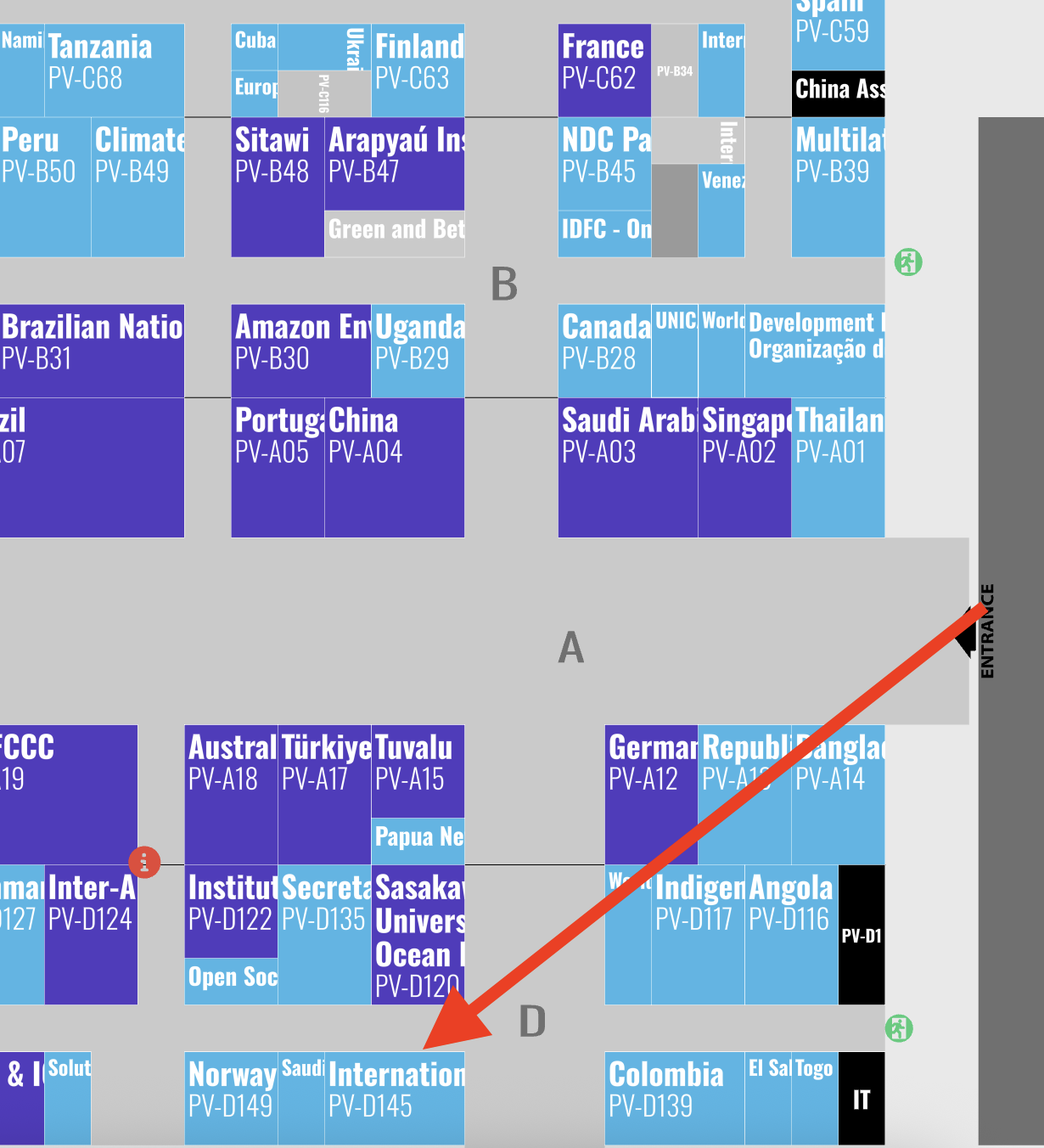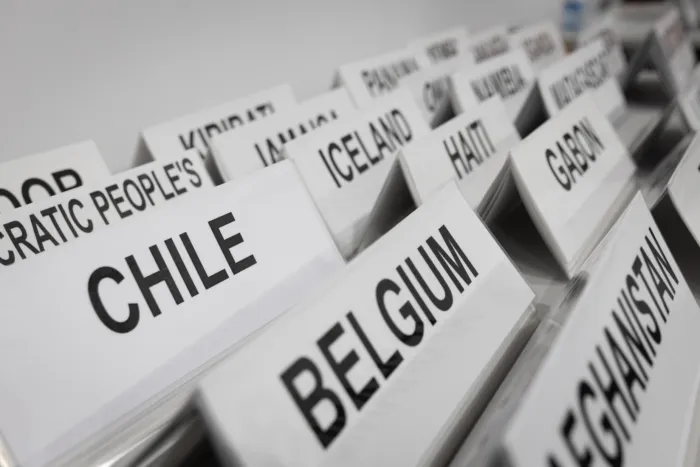
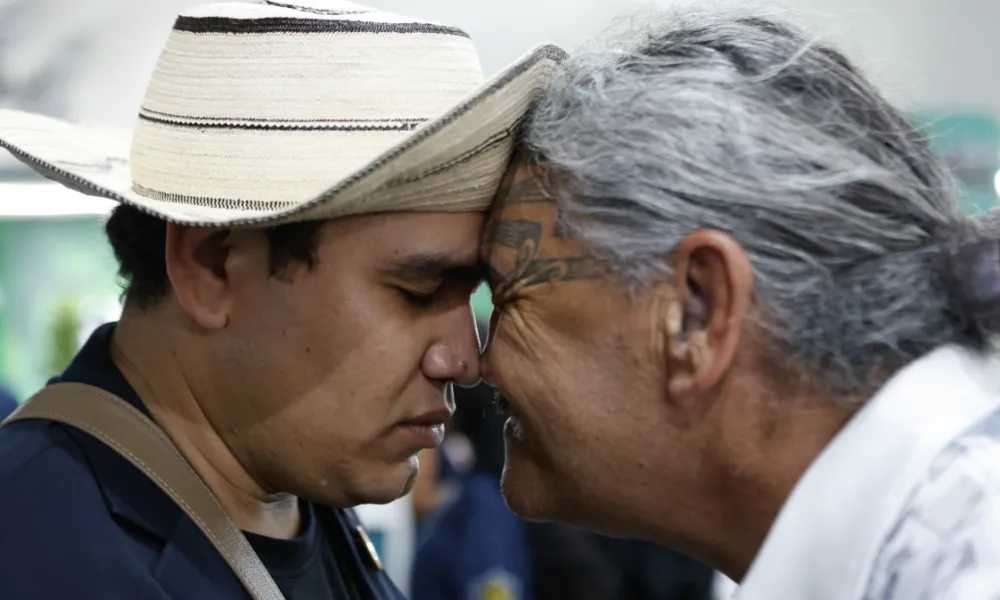
COPs never fail to inspire. There's always a moment when it is borne down on us that we're sharing this space with people from every other country on earth! Photo: UNFCCC
Day 4: 13 NOVEMBER 2025
Parties were locked in to negotiations on agenda items for most of the day, with no plenaries or stocktakes scheduled.
However we have heard that the supplementary agenda items continue to divide Parties, and we await an update on Saturday.
Observers report that the agenda item on this COP's response to the ambition and implementation gaps following the NDCs (AOSIS) continues to be pressed in the negotiations, while a growing number of countries have also called for a roadmap on the transition away from fossil fuels.
In fact, many countries reportedly have signalled support for a Roadmap for Fossil Fuel Transition, encouraging other countries to do the same and advocating for this to be part of the overall COP package. Brazil's President Lula da Silva had raised hopes for such a discussion last week, but COP30 President André Corrêa do Lago said it is not currently on the agenda.
The consultations on unilateral trade measures and Article 9.1 (provision of finance) are spreading, and appear to be surfacing across other discussion tracks, such as the Just Transition Work Programme and on Article 2.1c concerning all financial flows.
Unilateral trade measures could also become a bigger flashpoint, our observer sources say, with LMDC and the Arab Group pushing for dedicated discussions – while the EU stating it is open to talks 'without prejudice’ but wants WTO disputes kept out of the COP.
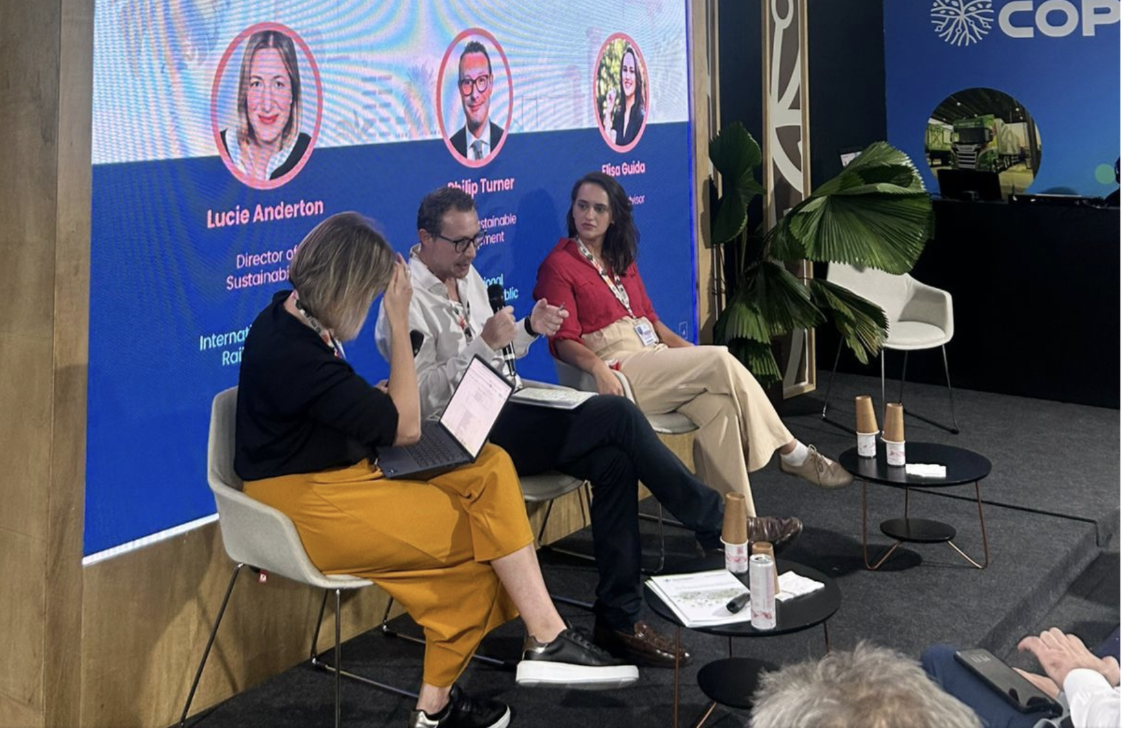
Elisa Guida of our Latin American team joined a panel discussion at the COP 30 Transport Pavilion to talk about funding transport for a net zero future. Source: IETA
In the negotiations
On Thursday morning Parties resumed their consultations on the Report of the PACM Supervisory Body.
Many groups encouraged exploring options to address the PACM's current financial situation, but we didn't record any specific suggestions.
On term limits for SBM members, some countries were in favour of extending term limits – notably those currently serving on the SB. Others opposed the unlimited re-election of SB members, and still others suggested revisiting this issue in 2028, and a few called for a practical solution to be agreed upon at this COP.
A number of countries expressed opposition to reopening the standards adopted by the SB this year. Instead, they called for the development of methodologies and for the implementation of the PACM to begin, in order that the application of methodologies to key activities can be assessed on a case-by-case basis.
There was support for setting a new deadline for the CDM transition, from as little as six months to as late as December 2026.
Parties expressed mixed views on the proposal to “encourage Parties to consider using the Article 6.4 mechanism, whether as buyers or sellers, to support the achievement of their NDCs”, with comments both for and against this language.
The next step is for the secretariat to produce a draft decision for the SBM report, which may be published tomorrow. Further engagement among Parties will depend on the draft's reception and whether there are any Party submissions on the text.
Immediately after the session on the SBM report came the resumed Article 6 informal consultation.
On environmental integrity and coherence, Parties expressed broad agreement on the need to strengthen environmental integrity and address systematic inconsistencies in Party submissions. The African Group called for coherence across Articles 4, 6 and 13 of the Paris Agreement.
On capacity-building, there was strong emphasis from the Coalition for Rainforest Nations, the UK, New Zealand and AOSIS on the need for continuous capacity-building — for both Parties and technical reviewers. Proposals included structured training programs and use of the PAIC platform for coordination.
On review process improvements, CfRN cautioned that reviewers must not reinterpret the information on the Initial Reports. Several Parties (UK, African Group) asked that Parties be able to respond to inconsistencies identified during reviews.
And looking to future work toward 2028, there was consensus that lessons from the review cycles should feed into the 2028 revision of the 6.2 guidance. The African Group suggested creating a working group or workshop series to systematise these lessons.
These talks will resume tomorrow at 1100 BRT.
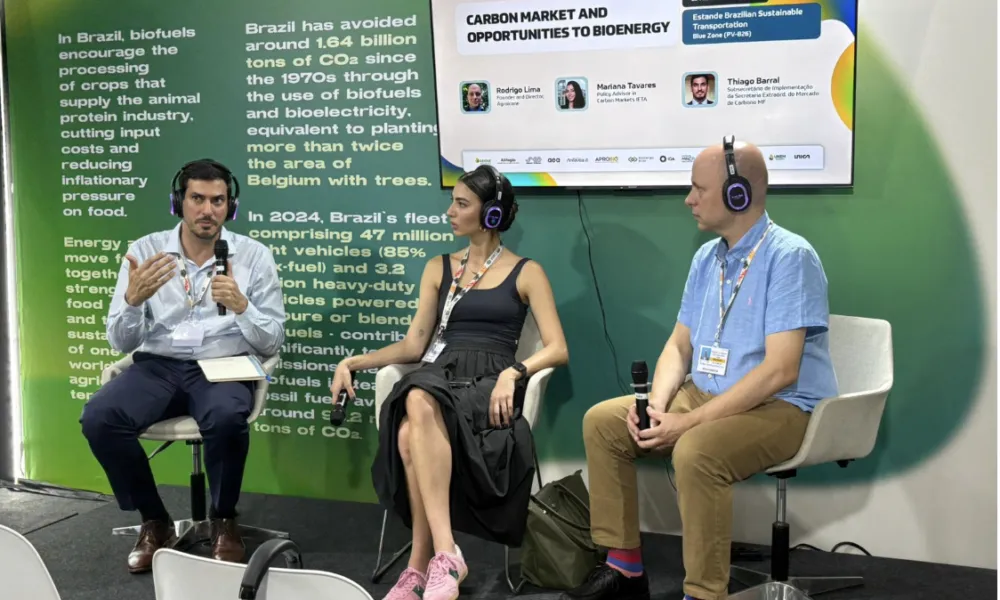
Mariana Tavares of IETA's Brazil Initiative spoke at a Brazil pavilion event on sustainable transportation in carbon markets and opportunities for the bioenergy sector in Brazil. Photo: IETA
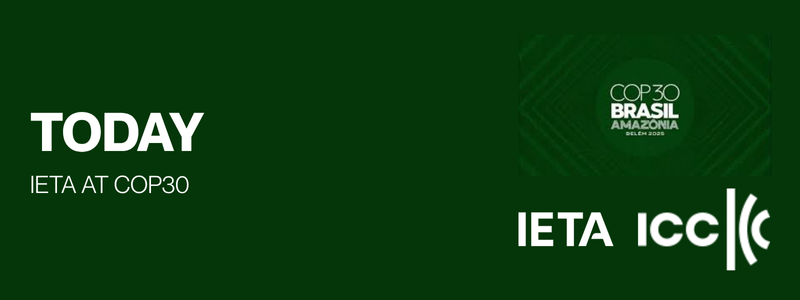
Perhaps the most popular event of the day at the IETA-ICC Pavilion today was a session on "The State of Article 6 Implementation".
The event featured speakers Nori Kimura from the Japanese ministry, Cristina Figuero, the Article 6 lead at ministry, Frederic Gagnon-Lebrun of South Pole, Lisa DeMarco of Resilient LLP and Martin Hession, the lead negotiator for the EU on Article 6 and chair of the Article 6.4 Supervisory Board (SBM).
Some of the speakers warned that supply of Article 6 credits is still a problem for the nascent market. South Pole in particular said that the focus on integrity standards raises the challenge of "balancing integrity and scalability: too much emphasis on integrity risks overburdening some sectors and discouraging participation."
Frederic Gagnon-Lebrun cited a study that showed a cookstove project would deliver 27% fewer credits under PACM methodologies compared to others — illustrating different policy approaches and levels of risk tolerance.
Japan's Nori Kimura focused on his country's Joint Crediting Mechanism, and conceded that Japan "does not yet have a strategy for Article 6.4."
He later added that companies complying with Japan's own emissions trading system would not be able to acquire Article 6 credits for use. "There are no current plans — [it's] JCM only."
Nevertheless, Kimura added, "methodologies are crucial for achieving ambitious targets — if they are too complex, they will not be used effectively.
Chile's Cristina Figueroa highlighted the progress that host countries are making in readying themselves for an Article 6 world. Host countries are increasingly interested in developing their own standards and methodologies, she told the meeting.
Likewise there is a strong focus on governance and integrity, with emphasis on maintaining environmental integrity in all transactions.
Figueroa noted in particular that "Designated National Authorities showed strong engagement during discussions on the latest draft of the permanence document."
For her, the main challenge for the market now is "deciding which types of activities should be approved under Article 6."
Lisa De Marco reminded the audience that "indigenous Peoples must be recognised as rights-holders", and that "mobilising large-scale capital requires strong and transparent governance."
"The post-Paris Rulebook environment introduces new legal complexities that must be addressed systematically and transparently," she said.
De Marco also addressed the current debate about whether to reopen the rulebook on the mechanism, and spoke up for regulatory stability: "if the mechanism is not scheduled for review until 2028, it should not be reopened prematurely. Stable fundamentals are essential to build market confidence."
The EU's Martin Hession discussed the EU's recently completed internal discussions on the bloc's 2040 climate target, noting that "debate continues on how to achieve this target effectively" – perhaps a reference to the EU decision to allow 5% use of credits in non-trading sectors.
Hession did aver that "the EU is likely to engage with international carbon markets in some capacity." He explained that "there is an expectation of lower overall crediting volumes over time. The EU frames the issue not only as a question of credit volume, but as one of ambition, structure, and long-term coherence."
In addition to tracking the progress of the talks, IETA staff were out and about speaking at numerous side events on Thursday.
Policy Advisors Mariana Tavares and Elisa Guida werre particularly busy. The both joined a town hall organised by the GCF Task Force – “Women for Forests and Climate – Discussion on Gender with GCF Task Force Leader”, where several women from different jurisdictions from Brazil and Latin America joined to share experiences and debate the creation of a work group to strengthen women participation in the climate agenda.
Elisa joined a panel organised by BNDES on Carbon Metrics for Bioeconomy. Together with Marcelo Behar (the COP30 special envoy for bioeconomy) and a representative of re.green, they discussed how the carbon markets can improve nature-related metrics and support the global south activities in reaching its full mitigation potential.
Mariana joined a panel on Brazilian sustainable transportation on carbon markets and opportunities for the bioenergy sector in Brazil. Alongside Thiago Barral, subsecretary for Implementation in the Extraordinary Secretariat for Carbon Markets in Brazil, and Rodrigo Lima, from Agroicone, they discussed the potential for Brazil to boost its short- and long-term incentives for the bioenergy sector, with carbon markets playing a key role in accelerating finance flows to activities such as BECCS. They also looked at the next steps of the implementation plan for Brazil's compliance market and its interplay with instruments from Article 6 and the voluntary carbon market. Mariana took the opportunity to showcase IETA's latest study, "Socio-economic impacts of Carbon Market Frameworks for Brazil".
Elisa joined a panel at the COP 30 Transport Pavilion to discuss funding transport for a net zero future. Panelists considered how to overcome missed opportunities in rail transportation, especially regarding Article 6 use. The panel heard key interventions from the audience, including Kenyan government representatives, indicating that finance and capacity building is much needed in emerging economies and that market mechanisms may be a good fit.
Our Latin American team was on hand to celebrate the state of Para's submission of its Registration Document and First Monitoring Report to ART TREES, after working since 2022 in the development of their REDD+ jurisdictional program.
The first monitoring report relates to 2023, where about 38.000.000 tons of emissions were avoided in deforestation reduction efforts.
IETA follows the JREDD+ theme closely, through an initiative called ALMA Brasil and and it was present in the announcement, as it collaborates with the state in discussing nesting strategies.
And earlier today, Pedro Venzon joined a livestream on LinkedIn to discuss the state of the negotiations as part of a small panel discussion hosted by Nicola Steen's "Pop-Up COP" in London. You can tune in daily at 1315 GMT or 1015 BRT.
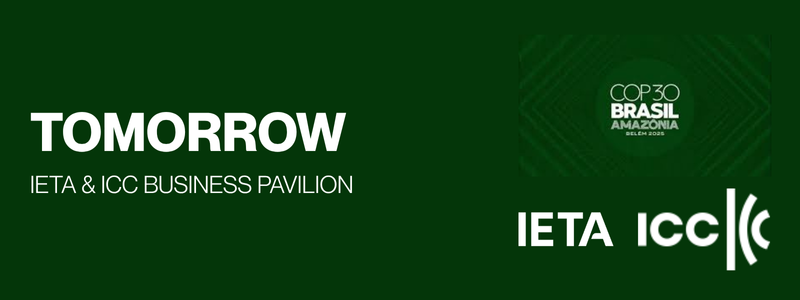
All event times are listed in Brasilia time (BRT), which is three hours behind GMT and 11 hours behind Singapore time.
The IETA/ICC Business Hub is located in Pavilion D145 (see image below). It's in area D of the Delegation Pavilions hall, quite close to the main entrance, and our neighbours are Colombia, the World Meteorological Organisation, Saudi Green Buildings Forum and the Oceans pavilion.
IETA has two side event venues within the Hub: the Boardroom and the Side Event Theatre. You can find the IETA schedule of events here, while the UNFCCC has produced an online schedule of side events here.
Friday (already?) kicks off at 1000 BRT with IETA launching a White Paper produced through the Business Partnership for Market Implementation (B-PMI) with support from PETRONAS, that consolidates practical recommendations to support Malaysia’s carbon market roadmap; balancing climate ambition with economic competitiveness. We'll hear from Mohd Hafdzuan bin Adzmi of Malaysia' environment ministry, Charlotte Wolff-Bye, chief sustainability officer at PETRONAS, Leo Pui Yong, CSO of Tenaga Nasional Berhad, and Natalie Florws of StoneX.
The Environmental Markets Fairness Foundation joins us at 1100 BRT with a session – held in Spanish – fostering dialogue to advance practical and equitable solutions for a just energy transition. It will emphasise the need for stronger coordination across policy, technology, and finance, while embedding social, economic, and health dimensions into climate decisions.
At 1300 BRT, Chile takes over for out final event of the day, to introduce its Roadmap on Carbon Pricing and Carbon Market Instruments, led by the Ministry of the Environment, and to showcase the progress achieved by Latin American and Caribbean (LAC) countries in the design and implementation of carbon pricing instruments. Speakers will include Maximiliano Proaño and Cristina Figueroa from the environment ministry, Carlos de Miguel from the Economic Commission for Latin America and the Caribbean, Rogelio Campos of Peru, Javier Martinez of Panama and Andrea Camponogara of the UNFCCC.
Elsewhere around COP, MSCI will host a side event on Friday at 15.30 in Special Event Room 5 "Tapajós" in the Blue Zone. They'll be presenting the findings of research on the economic value of forest carbon in Brazil!. There'll be lots of time for discussion in the session too. Details here.
